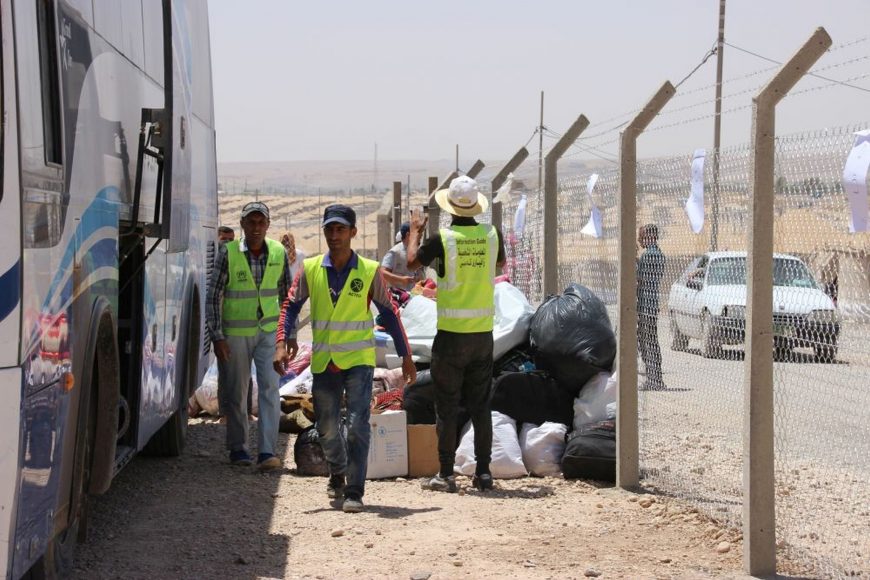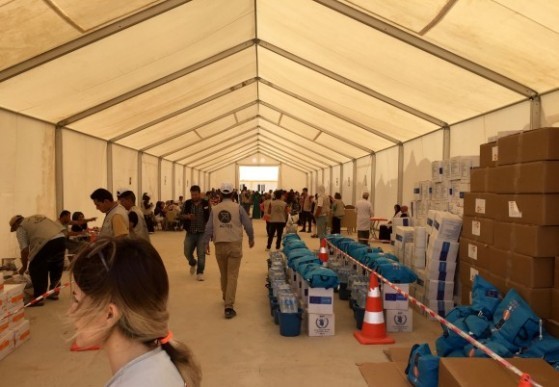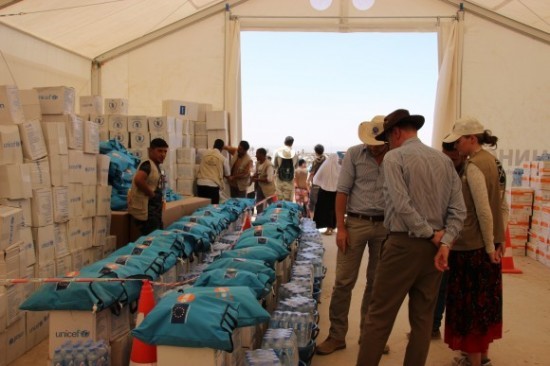
Nine months after the start of the military operations in October 2016, Mosul has been retaken over ISIL fighters, putting an end to months of bitter fighting that killed thousands of Moslawis and forced about one million out of the city, more than initially expected.
ACTED has been mobilized on the Mosul emergency response since day 1, relying on its historical presence in the country for almost 15 years as well as months of contingency planning and preparation, to provide multi-sectoral support to vulnerable displaced people who fled the fighting in Mosul city and Ninewa governorate.
Population displacements from Mosul city and Ninewa governorate steadily continued over the past month, with up to 8,500 people fleeing the affected areas every day, as the offensive to retake the Old City and the remaining West Mosul neighborhoods under ISIL control reached its final stages. Displaced people reached a transit site, about 25 kilometers south of Mosul, from where they were transferred to different camps in Ninewa governorate, or relocated in non-camp locations within host communities.
As a result of the siege on the Western part of the city Mosul, approximately half of the civilians fleeing the city are expected to relocate in camps, mainly in Hamdaniya district, South-East of Mosul.
A new camp was opened in Al-Salamiyah on May 23rd to host the latest displacements of populations from West Mossul. Salamiyah camps 1 and 2 located in Hamdanyia district, Ninewa governorate are managed by ACTED; a third camp could open to host additional displaced populations.
ACTED, liaising with other humanitarian partners and coordination structures, continues to respond to the needs of newly displaced and extremely vulnerable men, women, boys and girls. Support to displaced people includes, water, hygiene and sanitation interventions, shelter and non-food items support, as well as camp coordination and camp management operations and child protection services. ACTED also continued to deploy its Rapid Response Mechanism (RRM) teams to provide emergency assistance to civilians within 72 hours from displacement, distributing water, ready-to-eat food and hygiene kits.

Situation update: up to daily 8,500 displaced people over the month of June
Salamiyah camp: close to 30,000 displaced people 2 months after opening
ACTED manages Salamiyah 1 and 2 camps (Hamdaniya district, Ninewa) since May, which have been receiving an increasing number of individuals fleeingthe fighting in West Mosul. The camp currently hosts close to 9,000 people in Salamiyah 1 and 20,000 people in Salamiyah 2.
To ensure life moves along in the camp, ACTED teams also track service provision and potential gaps, and establishe youth, women and maintenance and camp management committees to ensure the camp residents’ participation in the camp decision-making processes. ACTED coordinates ten humanitarian partners, security actors and government bodies, by organising inter-agency coordination forums in each camp and weekly camp coordination meetings.
ACTED also addresses the shelter and non-food items needs in Salamiyah camp, reaching 24,000 people in June with sealing-off and non-food items kits distributions, while conducting assessments of the existing needs in East Mosul and villages of Hamdanyia district, reaching some 2,700 people with sealing-off and non-food items distributions.

ACTED: primary water, hygiene and sanitation responder in Salamiyah 1
ACTED continues to provide access to safe water, sanitation and hygiene to the over 9,000 residents of Salamiyah 1 camp. Since the opening of the camp, ACTED has been delivering an average of 300 m3 of chlorinated water per day through water trucking, thus allowing access to safe drinking water on a daily basis. Improving access to clean and safe water is particularly crucial to face the hot summer temperatures.
Today water flows through water lines and fills into elevated water tanks. In order to come up a more sustainable solution to the challenge of water availability, over the past months ACTED has been performing infrastructural work to install a distribution line, which connects the camp to the main pipeline running from Salamiyah water treatment plant. In addition to the 44 existing communal tanks, ACTED constructed 7 new elevated tanks, of a capacity of 30m3 each. As of today, the water storage capacity in the camp has increased, from 23 to 40 liters per person per day.
Next to basic water support, ACTED’s sanitation and hygiene response in Salamiyah camp includes the provision of garbage containers to some 800 households, alongside with waste collection activities, as well as distributions of monthly hygiene kits and baby kits and weekly hygiene promotion sessions.
Supporting the most at risk: ACTED child protection teams’ continued mobilisation
ACTED also provides emergency child protection services for vulnerable children and youth that fled the fighting. Some youth received psychosocial support through mobile child-friendly and youth-friendly spaces, while continuing to follow up on existing cases. ACTED also organizes recreational activities for children, including sport, games, drawing, music, drama and involves individuals in awareness-raising activities addressing the importance of education, of being tolerant, of making friends, but also the risks and prevention of sunburn. The child protection teams do not only focus on children needs within camps but also reach out to isolated population with the organization of a series of events in several villages in collaboration with schools.